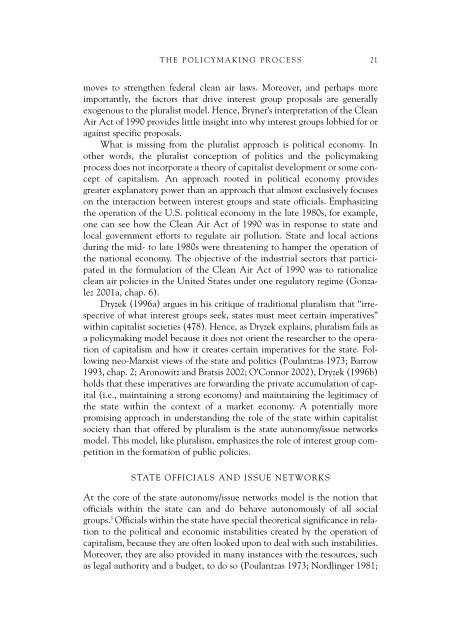GEORGE A. GONZALEZ - fieldi
GEORGE A. GONZALEZ - fieldi
GEORGE A. GONZALEZ - fieldi
Create successful ePaper yourself
Turn your PDF publications into a flip-book with our unique Google optimized e-Paper software.
THE POLICYMAKING PROCESS 21moves to strengthen federal clean air laws. Moreover, and perhaps moreimportantly, the factors that drive interest group proposals are generallyexogenous to the pluralist model. Hence, Bryner’s interpretation of the CleanAir Act of 1990 provides little insight into why interest groups lobbied for oragainst specific proposals.What is missing from the pluralist approach is political economy. Inother words, the pluralist conception of politics and the policymakingprocess does not incorporate a theory of capitalist development or some conceptof capitalism. An approach rooted in political economy providesgreater explanatory power than an approach that almost exclusively focuseson the interaction between interest groups and state officials. Emphasizingthe operation of the U.S. political economy in the late 1980s, for example,one can see how the Clean Air Act of 1990 was in response to state andlocal government efforts to regulate air pollution. State and local actionsduring the mid- to late 1980s were threatening to hamper the operation ofthe national economy. The objective of the industrial sectors that participatedin the formulation of the Clean Air Act of 1990 was to rationalizeclean air policies in the United States under one regulatory regime (Gonzalez2001a, chap. 6).Dryzek (1996a) argues in his critique of traditional pluralism that “irrespectiveof what interest groups seek, states must meet certain imperatives”within capitalist societies (478). Hence, as Dryzek explains, pluralism fails asa policymaking model because it does not orient the researcher to the operationof capitalism and how it creates certain imperatives for the state. Followingneo-Marxist views of the state and politics (Poulantzas 1973; Barrow1993, chap. 2; Aronowitz and Bratsis 2002; O’Connor 2002), Dryzek (1996b)holds that these imperatives are forwarding the private accumulation of capital(i.e., maintaining a strong economy) and maintaining the legitimacy ofthe state within the context of a market economy. A potentially morepromising approach in understanding the role of the state within capitalistsociety than that offered by pluralism is the state autonomy/issue networksmodel. This model, like pluralism, emphasizes the role of interest group competitionin the formation of public policies.STATE OFFICIALS AND ISSUE NETWORKSAt the core of the state autonomy/issue networks model is the notion thatofficials within the state can and do behave autonomously of all socialgroups. 3 Officials within the state have special theoretical significance in relationto the political and economic instabilities created by the operation ofcapitalism, because they are often looked upon to deal with such instabilities.Moreover, they are also provided in many instances with the resources, suchas legal authority and a budget, to do so (Poulantzas 1973; Nordlinger 1981;









